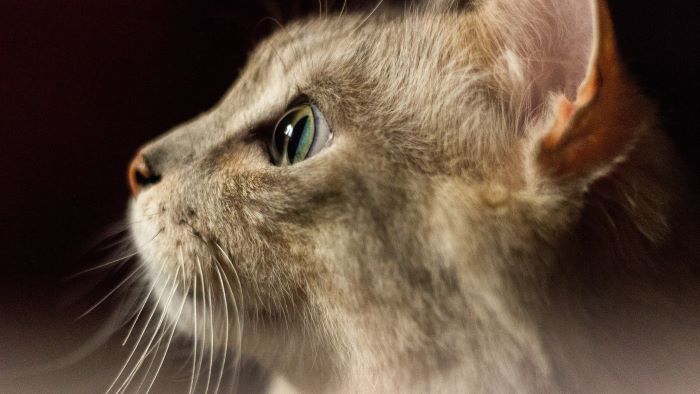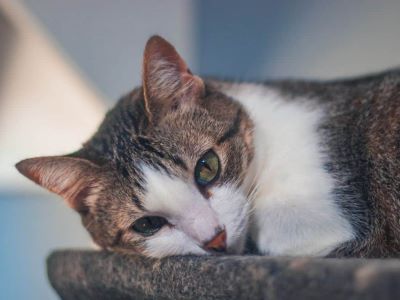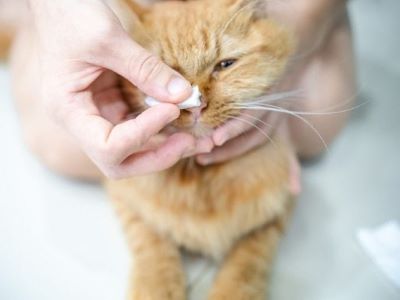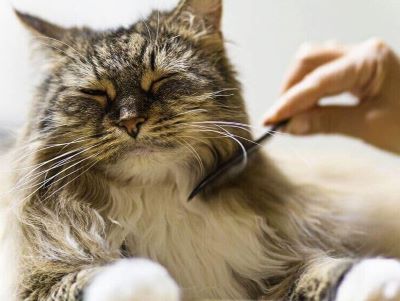Your cat friend brings you many smiles with its adorable tiny nose that twitches and sniffs everything it sees. But have you noticed an odd black stuff on the nose of your cat?

it’s a common occurrence that can be fascinating and lovely, so don’t be worried.
In this post, we will explore this mysterious substance, as well as its different effects on your cat’s health. So let’s search for knowledge to learn what the black stuff on your cat’s nose is all about.
What Is the Black Stuff on My Cat’s Nose?
The black stuff on your cat’s nose can be caused by various factors, some harmless and some potentially serious. Let’s understand the possible causes:
1. Boogers
Boogers are dried nasal mucus that can accumulate around the nostrils and sometimes the eyes.
They are usually harmless and a sign of a healthy respiratory system that produces mucus to protect the airways from dust, allergens, and germs[1].
However, if your cat has excessive boogers, it may suggest an underlying issue such as:
Viral Infection: “Some viruses, such as feline herpesvirus or feline calicivirus, can cause upper respiratory infections that result in sneezing, coughing, nasal discharge, and eye inflammation”, says the experts from VCA hospitals.
These infections are contagious among cats and can be treated with antiviral medications and supportive care.
Allergy: Some elements of their surroundings, such as pollen, dust mites, bacteria, or scent, may cause allergies in certain cats.
These allergies have the potential to set off an immunological reaction that results in nasal swelling, itchiness, sneezing, and nasal discharge.
Immunotherapy or medications can all be used to treat these allergies.

Foreign Object: Sometimes, a foreign object such as a blade of grass, a piece of fabric, or a seed can get stuck in your cat’s nose and cause irritation, inflammation, and nasal discharge.
Your cat may try to remove the object by pawing at its nose or sneezing. If the object is not removed by itself or with your help, you may need to take your cat to the vet to have it extracted.
2. Scabs
Another possible cause of the black stuff on your cat’s nose is scabs. Scabs are crusty formations that form over wounds on the skin.
They are part of the healing process and usually fall off by themselves when the wound is healed.
However, if your cat has scabs on its nose that do not heal or arise frequently, it may indicate an underlying problem such as:
Trauma: Your cat may injure its nose by scratching it with its claws, rubbing it against rough surfaces, or getting into fights with other animals. These injuries can cause cuts, bruises that bleed, and scabs.[2]
These wounds usually heal with proper cleaning and care, but they may get infected or reopen if your cat scratches them again and again.
Nasal Dermatitis: In certain cases, the black stuff on your cat’s nose might be a sign of nasal dermatitis, which is indicated by inflammation and irritation of the skin.
Allergies, infections, or environmental factors can start this condition. If you observe your cat overly scratching or rubbing its nose, it’s essential to seek veterinary advice.
3. Genetic Factors:
Genetics plays a significant role in determining the pigmentation of a cat’s nose. Certain breeds, such as the Bombay, Burmese, or Siamese, are more prone to having prominent nose pigment due to their genetic makeup.

How Can I Treat and Prevent Black Stuff on My Cat’s Nose?
Depending on the cause of the black stuff on your cat’s nose, there are different ways to prevent and treat it. The followings are some general tips that may help:
Keep Your Cat’s Nose Clean: To get rid of any particles, dirt, or boogers, gently wipe your cat’s nose with a wet towel or cotton ball.
To hydrate and clean your cat’s nasal passages, you can also use saline solution or nasal spray.
Avoid giving your cat medications since they might hurt it.
Keep Your Cat Hydrated: Ensuring your cat stays adequately hydrated is crucial for maintaining thin and unrestricted mucus flow.
- Make fresh water available in multiple bowls throughout your home.
- Consider using a water fountain, which often entices cats to drink more.
- Add water to your cat’s food, encouraging hydration during mealtime.
- Using a humidifier or vaporizer can introduce moisture into the air, assisting your cat in breathing more comfortably.
These methods collectively support your cat’s respiratory health by promoting sufficient hydration and facilitating easy mucus flow.
Keep Your Cat Healthy: Maintaining your cat’s overall well-being is key to ensure your cat’s health and happiness.
- Provide a well-balanced diet to meet its nutritional needs.
- Practice regular grooming sessions to keep its fur clean and untangled.
- Ensure your cat receives necessary vaccinations to protect against common diseases.
- Implementing periodic deworming to control internal parasites, and scheduling routine check-ups with a veterinarian for comprehensive healthcare, including dental care

These preventive measures play a vital role in safeguarding your cat’s health, minimizing the chances of experiencing the black stuff on its nose, and promoting a vibrant and contented feline companion.
FAQs
What Is the Black Stuff Coming From My Cat’s Nose?
It could be feline acne, a common skin condition in cats. What looks like a dirty chin could be a mild to moderate case of cat acne. Those black specks are blackheads, similar to blackheads in humans. In more severe cases, a cat can develop red sores and lesions on the chin area.
Are Cat Eye Boogers Normal?
Your eye boogers are a normal accumulation of different things, like dried tears and mucus. Cats get that crusty morning gunk as well. So long as there aren’t mounds of it, and your cat’s eyes are bright and clear, there’s no reason to panic.
Do Cats Cry Tears?
Cats don’t cry tears when they’re sad or in pain. But Halls says whether your cat is experiencing emotional or physical pain, they’ll exhibit behavioral changes that could include vocal crying. The sound of a cat crying is typically longer in duration and lower in frequency than day-to-day cat chatter.
Should I Clean My Cat’s Ears?
Most cats have healthy, clean ears and never need to have their ears cleaned. However, it is recommended to clean your cat’s ears if you notice discharge or an odor when examining the ear. Your veterinarian can help you decide how often your cat’s ears should be cleaned.
Conclusion
The black stuff on your cat’s nose is a unique and intriguing aspect of feline biology.
Most incidences of black crust around cats nose are harmless dried boogers. Usually, your cat will groom them away themselves, but you can lend a helping hand.
Occasionally, it can be a sign of an injury inside their nose, or a viral infection, it’s crucial to stay vigilant and seek veterinary advice if you notice any sudden changes in pigmentation or accompanying symptoms.
Embrace your cat’s adorable black nose, and cherish the joy it brings to your life.
Reference:
- Marvels of Mucus and Phlegm. (2020)- NIH.
- WebMD Editorial Contributors. (2020). Remedies for Cat Scabs- WebMD.

Patricia is a guardian to an exotic shorthair cat named Suz. She’s a professional cat trainer and behaviorist. She has expertise in writing on feline behavior, house training, and tips & tricks including product reviews of related products.

